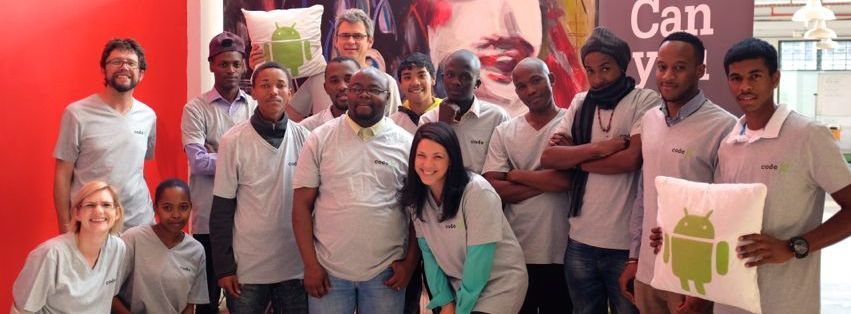Cape Town-based Project codeX is bidding to tackle the chronic lack of trained developers in Africa while also creating a new breed of entrepreneurs through its apprenticeship-style coding courses.
codeX, a venture put together by co-founders Elizabeth Gould, Michael Jordaan and Daniel Weber, began its first pilot programme in Cape Town in September, which ends with Demo Day on December 10.
The programme aims to create agile developers trained in standard programming languages like Java, PHP, Python and Javascript able to fit the industry’s needs and be creative enough to launch their own businesses.
Gould, a former journalist, told Disrupt Africa codeX was born from the knowledge Africa is facing a severe shortage when it comes to developers.
“We all had the same idea, which was there is no enough coders, let’s use this as a tool to bring people into the tech industry,” she said. “There’s a billion people getting online, and who is going to build the tech Africa needs? It has got to be Africans.”
She said as she travelled the continent in her previous roles many companies were asking for developers.
“I always wanted to do something that was a pre-accelerator. I could see the existing models that were going on didn’t promote inclusion,” she said.
codeX was designed not to be focused on one language in particular, but rather provide project-based training that left developers adaptable to the needs of a certain product.
“What are you trying to do, teach a language or teach people how to build tech? she said.
“We decided to take a really different approach to it, run codeX as if was a development shop as opposed to a coding academy. We tried to embed the skills in the context of a greater project.”
There were 800 applications for the pilot, which eventually accepted 11 individuals, eight of which will graduate from the programme.
“Most of them come from disadvantaged backgrounds, they come from townships. They have matric only. We want to broaden it out going forward,” Gould said.
The second programme, for which applications are now open, will take place in Cape Town from February, with the course divided into three terms of nine months. codeX is looking to take 40 individuals into the programme. The programme costs ZAR25,000 (US$2,250) per term of three months, while a corporate sponsorship for a disadvantaged coder for the full nine months is ZAR100,000 (US$9,000).
“It is not cheap but we have the best team in the business and the best stuff and the best contacts,” Gould said. “It doesn’t matter what their background is. If they can pay, great, but I’m working on getting sponsorships.”
She added the company makes no profit from the fees it charges, but instead plans to become profitable in future through licensing fees.
A Johannesburg launch is planned for March, and Gould has her eyes on expansion throughout Africa through a franchise model.
“We don’t want any one codeX to get that big, 40 is the maximum, we start losing influence otherwise. But we want them all over Africa, it will be like a franchise model,” she said.
Aside from bridging the skills gap, she said codeX was committed to developing the entrepreneurial ecosystem in Africa it graduates from its programmes were ideally placed to become the founders of the next wave of startups.
“What’s been awesome is that there are awesome ideas that I wouldn’t have been able to think of,” Gould said. “As soon as they have the basics, they come up with ideas, and we very much believe in following your passion. It is about people following their passion. Once they know enough to pick a passion they can follow it.”
She said companies were already getting in touch asking for developers.
“There is a large demand and a very small supply for developers across Africa. And as a result they don’t have to be very good and they’re hugely expensive,” she said. “There’s nothing really focused on the South African market, and it seems crazy, because there’s an acute need. We’re training high-end people that can think, we’re not training people to get a piece of paper. At the end they get a portfolio, and actual contacts at real companies.”
Gould said the main thing for codeX, which filters applicants in advance through online courses, was to work with creative people who wanted to build solutions.
“We source people as best we can from organisations that we work with, but anybody is free to apply. But the biggest thing that we want is people that can create. Show us something that you have made, it doesn’t have to be tech. What we can’t instill is a motivation to create, it has to be there. That’s the biggest thing,” she said.
“The biggest challenge between someone with a university degree and someone who doesn’t have one is not their intelligence, their business savvy, its simply the context of learning. It is knowing you can Google anything. Most of our coders learn that here.
“It is a very different way of thinking about education. It’s not an academy, it’s an apprenticeship programme. It is effectively learning on the job.”
codeX has also partnered with Innovate SA project Code4CT, which Disrupt Africa reported on last month, to launch a crowdfunding effort from coding training for girls next year.
“The goal is to create a much bigger set of feeders,” Gould said.
“What we would like to do is have a much broader base of people that have coding skills and take the cream of the crop from there and put them through codeX, the ones that are really going to be developers and entrepreneurs.
“This is a very long-term plan. This to me is a 10-20 year project. The idea is to create a much broader range of skills. And then codeX becomes the bridge between the basic skills and the industry.”


